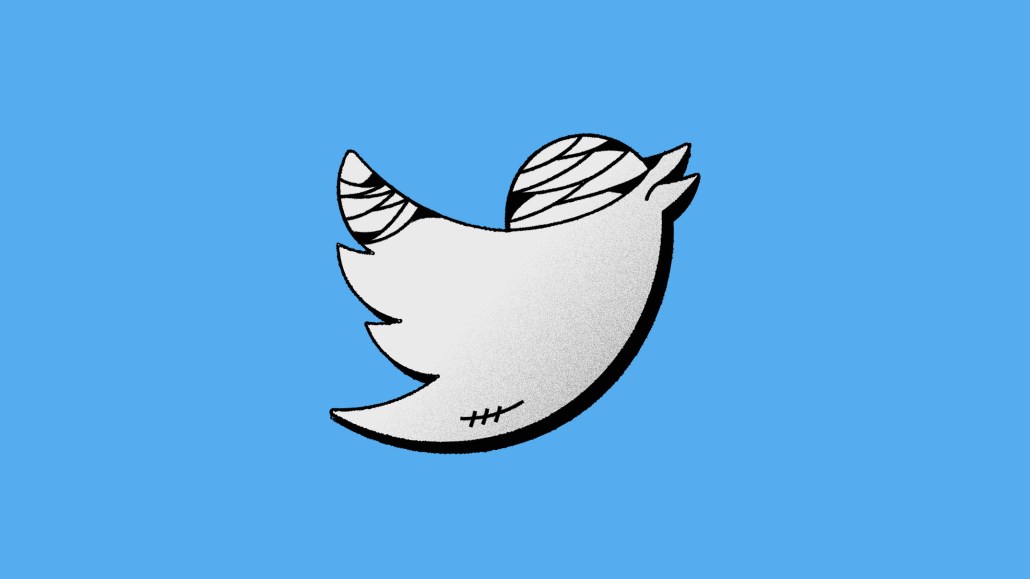Secure your place at the Digiday Media Buying Summit in Nashville, March 2-4
Digiday Research: Publishers see Twitter delivering least value among social platforms

This research is based on unique data collected from our proprietary audience of publisher, agency, brand and tech insiders. It’s available to Digiday+ members. More from the series →
In news, few social platforms feel more central, or more complementary to its mission, than Twitter. For many journalists, Twitter is a nearly unavoidable second work station and forum to make their names.
But when it comes to driving results for media companies, Twitter is near the bottom of the heap among social platforms despite being among the most widely used, according to new Digiday+ research.
In May, Digiday surveyed several hundred media and marketing professionals about the role that social platforms play in their businesses. 107 publisher professionals completed the survey, and they work at a variety of places: One-third of the respondents work for publishers with annual revenues under $10 million, and one-third work for publishers with annual revenues over $50 million.
Digiday asked respondents about how they use eight different platforms, which range from established platforms such as Facebook, Twitter and YouTube to more emerging, more niche choices such as Twitch and TikTok.
The overall results depicted a landscape where a handful of platforms have become stable parts of publishers’ businesses, and the rest are on the fringe; after years of imagining a future where many publishers might be platform-first, it appears most have gone the other way, with a majority of them regarding most platforms as minor sources of revenue and brand building. Social media has become, as one audience development consultant put it, a box you have to tick.
This dynamic was perhaps most pronounced for Twitter. Despite being the second most commonly used platform — 94 out of the survey’s 107 publishers had posted content to Twitter in the past 30 days — just one-fifth of the publishers that use Twitter said the platform was at least a “valuable” source of revenue. Only Twitch, which 17% of users described that way, scored lower, but just six of the survey’s respondents said they use Twitch.
Less than half, or 45%, of the publishers that use it said it was at least “valuable” for brand building; only Snapchat scored lower, and a non-representative number of respondents, 20, said they publish content on Snapchat. Twitter declined to comment on this story.
These low marks reflect the data around how much money publishers invest in content for platforms. Despite being tied with Facebook for post frequency — more than 80% of the publishers using Twitter post on it daily — Twitter ranks last among all platforms in content investment: Just one-third of respondents said they invest even a “moderate” amount in creating original content for it.
This current dynamic could change as the year wears on. Twitter has been pouring money and resources into features that will allow users to pursue consumer revenue on its platform, as well as new tools, such as Spaces, which create new opportunities for user engagement; those changes have caught publishers’ attention. The platform is also in the midst of pursuing a goal that would see the platform double its revenue by 2023 — hitting such a goal would surely involve publishers benefiting as well.
But for now, the relationship between media and Twitter looks like it needs to be rethought.
More in Media

From feeds to streets: How mega influencer Haley Baylee is diversifying beyond platform algorithms
Kalil is partnering with LinkNYC to take her social media content into the real world and the streets of NYC.

‘A brand trip’: How the creator economy showed up at this year’s Super Bowl
Super Bowl 2026 had more on-the-ground brand activations and creator participation than ever, showcasing how it’s become a massive IRL moment for the creator economy.

Media Briefing: Turning scraped content into paid assets — Amazon and Microsoft build AI marketplaces
Amazon plans an AI content marketplace to join Microsoft’s efforts and pay publishers — but it relies on AI com stop scraping for free.








